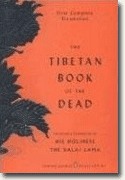The Tibetan Book of the Dead
Gyurme Dorje, tr.
book reviews:
· general fiction
· chick lit/romance
· sci-fi/fantasy
· graphic novels
· nonfiction
· audio books
· author interviews
· children's books @
curledupkids.com
· DVD reviews @
curledupdvd.com
newsletter
win books
buy online
links
home
for authors
& publishers
for reviewers

 |
The Tibetan Book of the Dead: First Complete Translation Gyurme Dorje, tr., & Graham Coleman/Thupten Jinpa, eds. Penguin Paperback 592 pages January 2007 |
|
What can a mere book reviewer add to the wisdom of the ages?
This Penguin edition of the sacred text distinguishes itself with color illustrations and sturdy pages. But most of all, it is distinguished by the introduction by His Holiness the Dalai Lama, a man as revered as a human being can be by people all over the world. The Dalai Lama seeks in his brief commentary to explain in layman’s terms the journey of the soul and its connection to the flow of life, beliefs at the core of Buddhist teaching. Leaving aside the intricacies of the many gods and beings that one might encounter in the reading of the book, he elegantly and simply indicates that a good death, which may be accomplished by a good life including meditation, religious ritual and the attempt to come into harmony with all natural phenomena, can lead one to the highest sphere of existence, the domain of the Buddha-body. The Dalai Lama suggests that religious practices be regarded as a way of preparing oneself for an inevitable event. And he admits that although such practices are part of his own daily routine, “I do wonder whether or not I will really be able to fully utilize my own preparatory practices when the actual moment of death comes!” This book is long, as a good bible should be, and much of what is contained in it will have a bizarre overtone to people raised in Western faiths. Much of it was meant to be chanted. Some of the information is more than we want to know, describing in unpleasant detail the nightmares and physical deteriorations that presage human death. Yet there is nothing here that we should avoid reading. It’s all about our common experience, the one we can’t share. It’s comforting to know that someone cared enough to collect some road maps for the journey. As one Tibetan “psalmist” supplicates in the section called “The Acts of Confession,” At the time of my death, when my mind and body separate, Originally published on Curled Up With A Good Book at www.curledup.com. © Barbara Bamberger Scott, 2007 |
|
|
|
 Click here to learn more about this month's sponsor! |
|
| fiction · sf/f · comic books · nonfiction · audio newsletter · free book contest · buy books online review index · links · · authors & publishers reviewers |
|
| site by ELBO Computing Resources, Inc. | |
